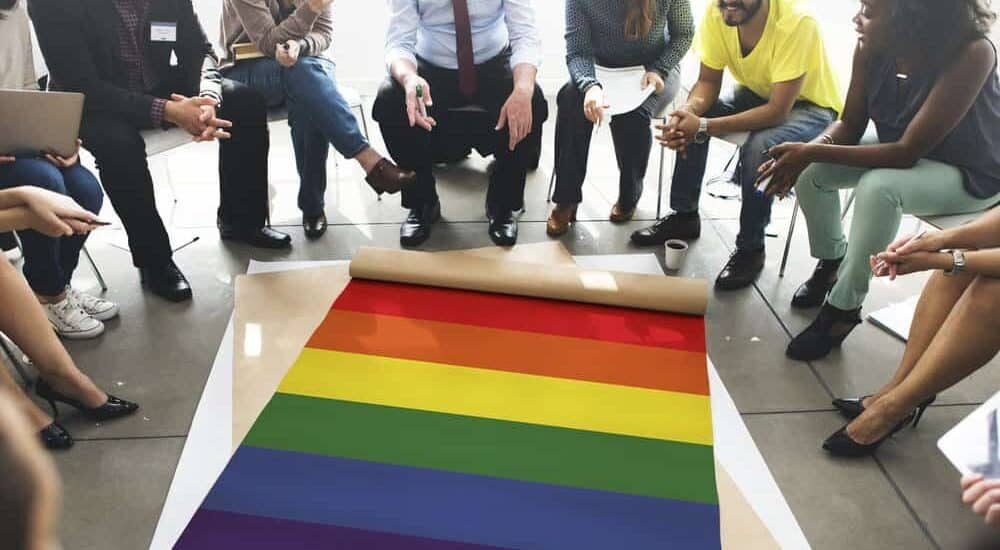Acceptance does not equal allyship. There’s a colossal difference between showing passive acceptance of LGBTQ+ communities and being an active advocate for genuine inclusion. Often, passivity is a result of fear – fear of using incorrect terms, saying the wrong thing, and causing more harm than good. But, if we avoid difficult conversations, ones which open our eyes to new perspectives and have the power to open doors for others, we cannot truly drive change.
If we are to create working environments which not only respect individuality, but actively encourage the expression of it, we must be driving active allyship. So, how can employers, employees and leadership teams be better allies to LGBTQ+ communities?
Understanding adversity
It’s vital that we remember ‘LGBTQ+’ is an umbrella term for a myriad of sexualities and gender identities, and no two individuals will share the same lived experiences. An integral part of allyship is to elevate the voices of those who are part of LGBTQ+ communities, ensuring there are platforms for each person to voice their thoughts, opinions, and experiences while listening to the unique challenges faced by each one.
By listening and learning, allies can make better-informed decisions, adjust where necessary, and implement inclusive policies which are genuinely beneficial for everyone involved. It’s important to check in regularly, and above all, dedicate time to do your own research too; it’s crucial to remember that self-education is key as the burden to educate shouldn’t lie with your LGBTQ+ employees.
Employee Resource Groups
Employee Resource Groups (ERGs) and networking groups are an excellent way to facilitate open, honest conversations about allyship in the workplace. These create formal channels of communication between employees and senior leadership teams, which allows decision makers to be held accountable in creating LGBTQ+ inclusive policies and ensuring wider business strategies and agendas are fit for the many identities of these communities. Programs such as INvolve’s Effective Networks sessions brings together network leads and committee members from ERGs to address the common challenges networks and resource groups face, and is useful to support ERGs across businesses.
Mentoring
Mentoring LGBTQ+ employees is a great way for an active ally to leverage their influence, extend their professional networks and support LGBTQ+ talent in their career development. Equally, reverse mentoring can be instrumental in creating an inclusive workplace, as junior team members bring fresh perspectives to the table and provide unique insights often helping employers to understand cultural shifts, changing attitudes, and the barriers faced by their younger LGBTQ+ colleagues. INvolve’s Cross Company Mentoring Program is a fantastic scheme to get involved with and specifically supports high-potential diverse talent in their career development.
Diversifying leadership
Audeliss work with global clients to diversify senior leadership teams and level the playing field for diverse talent. Businesses should reflect the societies that they serve and it’s vital that decision-makers are not only serving as visible role models for their employees but are in positions of power that allow them to drive change.
Unfortunately, the lack of LGBTQ+ senior leadership is very apparent across both FTSE 100 and Fortune 500 companies. Our Pride at Work report investigates this significant absence of LGBTQ+ leadership in organizations across the UK and the U.S. and what companies should be doing to more successfully attract, progress and retain LGBTQ+ talent.
It’s vital that change is driven from the top down and having a senior leadership team that reflects this and embodies a diverse range of perspectives and insights, is key not just for long-term business success, but entrenching inclusion across all levels of the business. After all, people can’t be what they can’t see.
Elevating marginalised voices
Where minority groups intersect, experiences can vastly differ. Research released by McKinsey reveals that stress levels, feelings of isolation and the pressure to perform increase when a person experiences ‘onlyness’ – being the only one on a team or in a meeting with their given gender identity, sexual orientation, or race. LGBTQ+ women, for example, who are workplace minorities in both gender and sexual orientation, are twice as likely as women overall to report being an ‘only,’ and they’re seven times more likely to say so than straight white men.
According to YouGov, 35 percent of LGBTQ+ employees feared discrimination to the extent they would not consider coming out to colleagues; whereas for LGBTQ+ Black, Asian, and ethnically diverse employees, the figure leaped up to 42 percent. Allies must recognize such variances, understanding how to not only amplify the voices of LGBTQ+ communities as a whole but, when necessary, shift the focus to specific groups which are being impacted disproportionately.
It is vital for allyship to move beyond passivity and be active in their advocacy. In the workplace, allies must speak out against discrimination, support others in sharing their stories, and educate themselves about the invisible barriers faced by their peers. They must leverage their influence to shape policies and, thereby, create businesses that ensure LGBTQ+ people can succeed and reach the top. Authenticity in the workplace is crucial to employee performance, happiness, and overall creates a healthier work environment, therefore it is vital for active advocates to steer their businesses towards a more inclusive and fair future for all.
